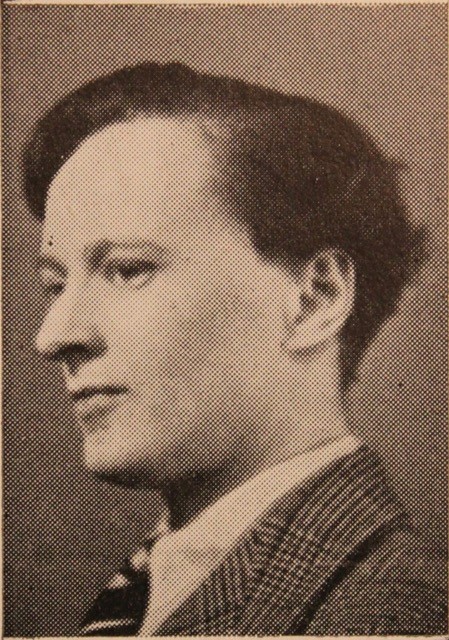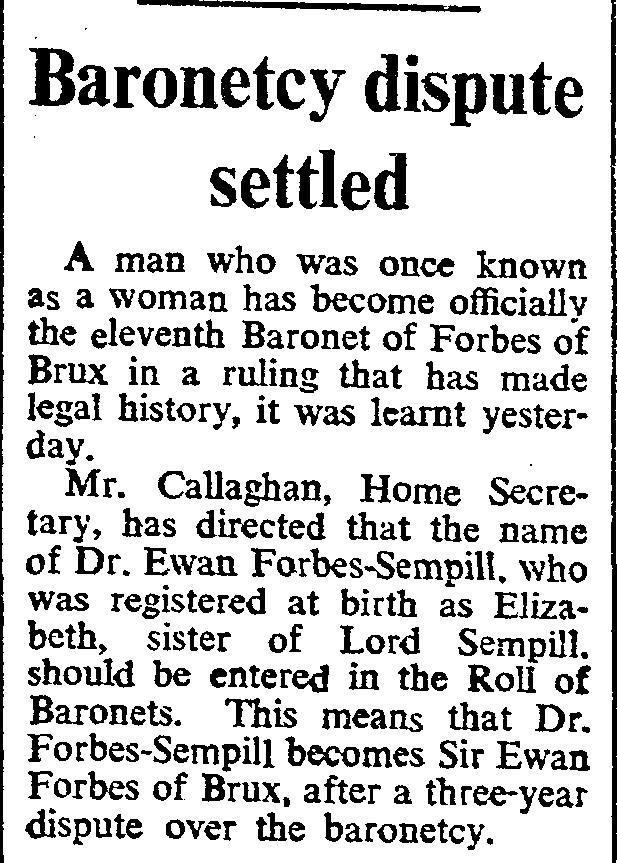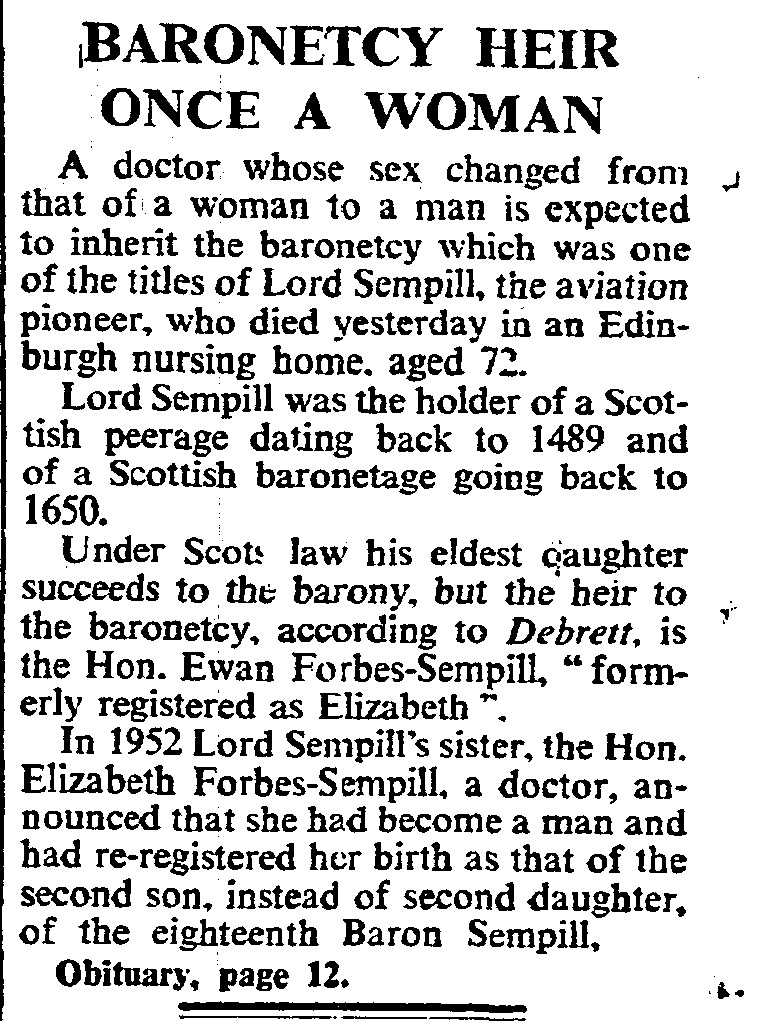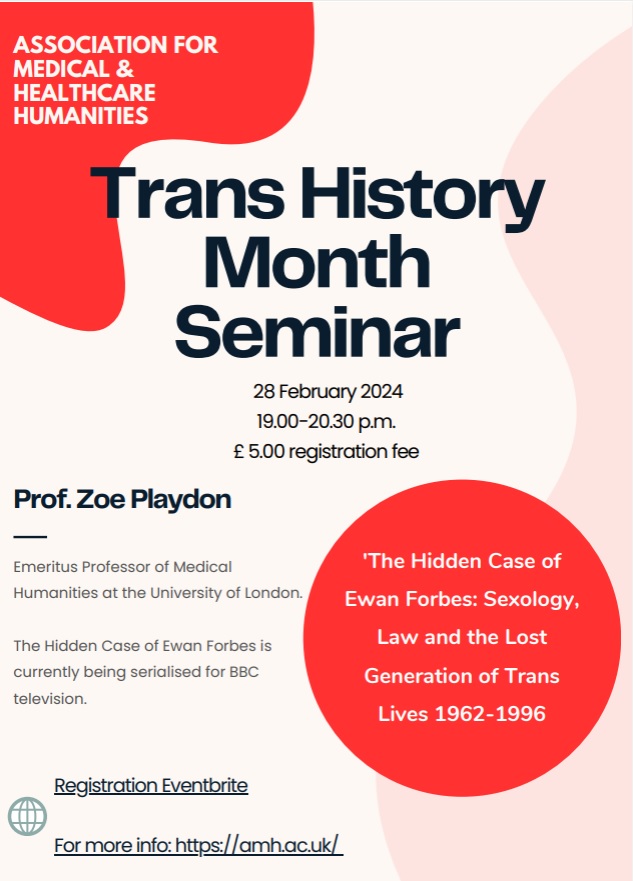
In 1943, the respected Greek physician Alexander Polycleitos Cawadis wrote ‘the sex that brings the most happiness and the best adaptation is surely the true sex’. (p.31) A statement that Zoë Playdon interprets as posing ‘the ethical question of compassion: what do we owe to each other?’ (2021, p.179). As human beings, what is our duty of care towards one another’s wellbeing?
We often consider our rights as individuals to have steadily improved over the last century in the UK, however, the 1950s marked a downward turn for trans individuals who were increasingly considered to be suffering from mental illness. According to scientific medicine at the start of the century, ‘being trans was simply a form of physical intersex, people who were biologically different and natural justice demanded they be supported and accepted, not persecuted.’ (ibid, p.36). In the main, clinicians had recognised that individuals knew their own minds and supported their patients in living their best possible life. A new set of ideas developed around gender identity during the 1950s that asserted an individual’s legal sex was determined by their biology and could not be altered no matter how a person felt about themselves.
The life of Sir Ewan Forbes (1912 – 1991) spans this change in the trans experience and his legal battle reverberates through current debate on trans rights and male primogeniture (firstborn) succession. The legal case of Ewan Forbes only came to light in 1998 when the Home Secretery allowed Playdon access to the court transcripts, having been concealed from the public for 53 years. Playdon retired from her legal profession in 2014 and devoted the following 5 years to researching and writing about Ewan’s life. The resulting book ‘The Hidden Case of Ewan Forbes’ was published in 2021 and is available to read via Libby – login with your CCCU computing account. The book is currently being serialised for BBC television.
Who was Sir Ewan Forbes?
Born to an aristocratic family in Aberdeenshire, Ewan Forbes was christened Elizabeth Forbes-Sempill. He had been registered as female on his birth certificate, an act that he would later condemn as a ‘grievous error’ (ibid, p.115). He considered himself male from a young age and been permitted to live, dress and play how he liked at home, except on formal occasions when he was expected to wear girls clothing. Later, Ewan would say these occasions made him feel ‘like a bird that had had its wings clipped.’ (ibid, p.39)

At 15 years old, Ewan had embarked on a trip across Europe with his mother to receive early hormone treatment (presumed to be testosterone injections) from European medical specialists alongside elective counselling. His mother’s support was progressive for the time and, according to Playdon, encouraged Ewan to develop a positive sense of self.
Ewan graduated as a medical doctor in his early thirties and worked as a GP in his local market town of Alford where patients referred to him as ‘Doctor Forbes’. Working amongst his local community, Ewan wore a suit and was much revered by his patients who described him as kind and caring (ibid). In 1950, Ewan proposed to Isabella Mitchel (known as ‘Patty’), later asserting that ‘I felt the right to have my own wife and my own house and take my place as other ordinary individuals.’ (ibid, p.87). To ensure the marriage was legally binding, Ewan submitted a request to change the sex on his birth certificate to male. At the time, his request needed to be countersigned by three medical doctors and carried a nominal sum for administrative costs. The correction was accompanied by small print which showed the certificate had been amended; ‘The above particulars incorporate any subsequent corrections or amendments to the original entry made with the authority of the Registrar General’. (ibid, p.16). The right to change the gender on your birth certificate vanished in the UK during the 1960s and was not reintroduced until 2004 with the Gender Recognition Act.
The change to Ewan Forbe’s birth certificate was publicly announced on 12 September 1952. As a legally registered man, Ewan had become next in succession (after his older brother) to the Forbes baronetcy. This triggered the national press to flock to Aberdeenshire, blocking the narrow country roads and affecting Ewan’s day-to-day medical practice. Shaken by the exposure, he hid away from media attention for the next decade. The local community supported their esteemed doctor, with Playdon explaining they ‘insulated him from the popular press’s increasingly hostile view of trans people.’(ibid, p.115)
Rise in Systemic Transphobia
Whilst Ewan worked to maintain a quiet life, the trans-experience was rapidly changing. In the US it had become standard practice to surgically treat intersex babies’ as soon as possible after birth, with medical practitioners designating either male or female gentalia, often opting for the easiest option. A crude and deplorable in-joke evolved; ‘it’s easier to make a hole than a pole’ (ibid, p.118). Gender-appropriate-rearing then reinforced the gender that had been assigned to the child. In the UK, gender identity had no diagnostic criteria or clinical standards with GPs permitted to treat patients as they saw fit. Find the right clinician and you could receive the support required to live a fulfilled life. Conversely, a growing number of clinicians viewed trans people as ‘diseased at best and depraved at worst.’ (ibid, p.116) It was in this unregulated context that NHS consultant John Randell was able to deny surgery and warn trans individuals against attempts to marry. John Randall appears in A Change of Sex; a ground-breaking BBC documentary broadcast between 1979 – 1999 that follows Julia Grant’s fraught gender transition. Watch on BOB with your CCCU computing login.
The first gender identity research clinic was established in 1962 at the University of California. Founded by Dr Richard Stoller, the clinic’s primary aim was to prevent or cure transgender individuals using conversion therapy. The idea spread and other clinics opened across the US. Some clinicians in the UK were influenced by the American approach, Randell being an example. Randell promoted hormone replacement therapy and psychotherapy to heterosexual cross-dressers to “save” them from becoming transsexual.
The UK has a long history of conversion therapy as this guide by Stonewall explains – Everything you need to know about conversion therapy | Stonewall.
The UK Government is committed to introducing a ban on conversion therapy in the near future and the summary of proposals can be found here: Banning conversion therapy – GOV.UK (www.gov.uk). Though, it is interesting to note that the ban had initially excluded transgender therapy- UK conversion therapy ban to include trans people – BBC News.
Court Case of Ewan Forbes
Ewan’s brother William Forbes-Sempill died on 30 December 1965 and his Baronetcy title, the estates of Craigever and Fintray, together with the family jewels and art collection came under dispute. Baronetcy is subject to the rules of primogeniture and must pass to a male heir. This is still true today, though there have been calls for change. Ewan’s cousin John Forbes-Sempill did not hesitate to stake his claim on the grounds that Ewan was not a “real man”. Consequently, Ewan’s tranquil life with his wife Patty was under threat with the pair also potentially facing a prison sentence for perjury if the court determined Ewan to be female. What followed was a court case with ‘so many twists and turns it almost stretches credulity’ (Merritt, 2021). Ewan fought the case by garnering the support of 8 expert clinicians including Professor Paul Polani who was the leading expert on intersex conditions. Playdon observes that ‘all the experts had made it clear that individual self-declaration was the only valid basis for determining sex.’ (2021, p.191) After a 4-day hearing in May 1967, the judge took 8 months to come to a decision in Ewan’s favour. The judge intentionally limited his verdict to the facts of Ewan’s case to avoid destabilising male primogeniture succession and risk a constitutional crisis. The proceedings had been heard in private and were subsequently concealed.
Reluctant to accept his defeat in court, John appealed to Lord Lron who was the authority on all matters of inheritance. This delayed the final decision by yet another year. In 1968, the Home Secretary finally confirmed Ewan as the 11th Baronet Forbes of Craigevar. The two newspaper articles below were found on the British Library Newspaper database listed here– login with your CCCU account. Though this ruling must have come as a relief, the court case nevertheless brought Ewan and Patty significant financial costs, alongside a great deal of personal anguish and humiliation.


Setting a Precedent
The landmark court case of trans woman April Ashley (Corbitt V Corbitt) took place in November 1969, a year after Ewan received his Baronetcy. Read an account of the case on the National Archives blog. Overseen by Justice Roger Ormrod, the case saw ‘April’s body and mind forensically scrutinised in an attempt to determine her legal sex.’ (Iglikowski-Broad, 2023). On 2 February 1970, Ormrod ruled that April was male, setting a precedent that the sex assigned at birth was an individual’s legal sex. Furthermore, the gender on birth certificates could no longer be corrected. Playdon explains the legal ramifications of the ruling;
‘The UK’s system of common law works by what is known as ‘the doctrine of precedent’ which means that the judgement of a key legal case binds all subsequent cases, unless that judgement is changed by a more senior court.’ (2021, p.13)
To find out more about precedent in UK Law, the following library book may be of interest: Precedent in English law (sirsidynix.net.uk)
Almost 30 years later, the case of ‘P V S and Cornwall County Council’ in 1996 set trans rights on a different trajectory. The claimant named only as ‘P’ was found to have been wrongfully dismissed from her workplace after informing employees that she was undergoing gender-reassignment surgery. The scope of sex equality broadened to include discrimination against trans people and this was later captured by the Equality Act 2010. Read more about the Equality Act and what it means for trans people here: The Equality Act 2010 – TransActual.
The next momentous case for trans rights occurred in 2002 when trans woman Christine Goodwin took the UK government to court after experiencing sexual harassment at work during and after gender-reassignment surgery. She had also been unable to change her National Insurance number, allowing future employers to find out her previous name and gender. Overseen by the European Court of Human Rights, the case found that UK law violated the right of trans people to a private life and recommended that the government recommence issuing new birth certificates that reflect an individual’s gender identity. The ruling resulted in the Gender Recognition Act 2004. More on this Act and what it means here: The Gender Recognition Act 2004 – TransActual. If interested in reading more on the tension between UK and European human rights find this book in the library: The UK and European human rights : a strained relationship? (sirsidynix.net.uk)
Trans Rights today
Fast forward to today and campaign groups such as Stonewall and Transactual are calling upon the UK government to reform the Gender Recognition Act and bring it in line with international best practice. It is their hope that the process of changing the gender on birth certificates will be made less complicated, less time consuming (current wait of 2 years) and less intrusive.
A report published by Stonewall in 2018 revealed the enduring prevalence of transphobia in the UK today with 2 in 5 trans people experiencing hate crime in a 12-month period. Transaction is calling on the trans community and their allies to create positive change through collective action. Find out how you could get involved here: Bringingaboutchangeleaflet2021.pdf (transactual.org.uk)
Further guides on healthcare and online safety for trans individuals can be found here: Downloadable Resources – TransActual
Support at CCCU
Canterbury Christ Church University is committed to providing an inclusive and welcoming community where staff and students feel respected, safe and confident to bring their whole selves to work and study. The University actively encourages staff and students to report any harassment through our Report + Support webpage. Our Expect Respect Pledge outlines the actions and behaviours we can all take to make sure our community is inclusive.
“None of us are equal until everyone is equal”
Zoë Playdon (2021)
Upcoming Event
Book to attend this upcoming online event here: Ewan Forbes: Sexology, Law – A Lost Generation of Trans Lives – Zoe Playdon Tickets, Wed, Feb 28, 2024 at 7:00 PM | Eventbrite

Resources
This blog post was written as part of LGBT+ History Month. Visit their website at LGBT+ History Month 2024 – LGBT+ History Month (lgbtplushistorymonth.co.uk)
The University’s Trans and Non-Binary Inclusion Policy can be found at Transgender Non-Binary Inclusion Policy – Students-Staff (canterbury.ac.uk)
A Selection of Books available through the Library
Tomorrow will be different : love, loss, and the fight for trans equality (sirsidynix.net.uk) (eBook)
Queerly autistic : the ultimate guide for LGBTQIA+ teens on the spectrum (sirsidynix.net.uk) (eBook)
To my trans sisters (sirsidynix.net.uk) (eBook)
The autistic trans guide to life (sirsidynix.net.uk) (eBook)
Supporting trans people of colour: how to make your practice inclusive (sirsidynix.net.uk) (eBook)
Pageboy : a memoir (sirsidynix.net.uk) (Print Book)
Bibliography
Cawadis, Alexander Polycleitos. (1943) Hermaphroditus: The Human Intersex. London: William Heinemann
Iglikowski-Broad, Vicky (2023) ‘April Ashley: The legal battle’, The National Archives, 17 April 2023. Available at: https://blog.nationalarchives.gov.uk/april-ashley-the-legal-battle/ (accessed 15 January 2024)
Merritt, Stephanie (2021) ‘The Hidden Case of Ewan Forbes by Zoë Playdon review – a fascinating trangender life’ The Observer, 26 December. Available at: https://www.theguardian.com/books/2021/dec/26/the-hidden-case-of-ewan-forbes-by-zoe-playdon-review-a-fascinating-transgender-life (accessed 16 January 2024)
Playdon, Zoe. (2021) The Hidden Case of Ewan Forbes. Bloomsbury Publishing. Find on Libby
Playdon, Zoe (2021) ‘Why This Trans Boy Had More Rights a Century Ago Than Many Trans Children Today.’ Time, 2 December 2021. Available at: Ewan Forbes’ Childhood a Century Ago and Trans Rights Today | TIME (accessed 15 January 2024)
 Library
Library Rebecca Law
Rebecca Law 473
473



